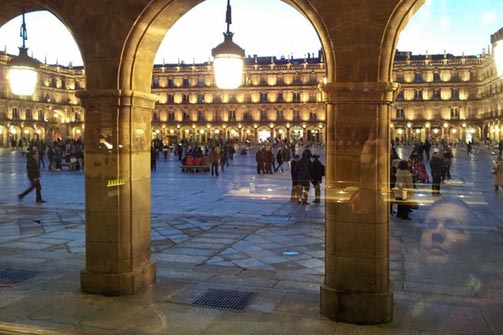‘Welcome to Salamanca! Escúchame. Listen to me. I’m old dog. I have been to all the countries. It’s the same shit everywhere. But this place, Salamanca – I don’t know what it is, I love it. It catch me. Welcome to Salamanca!’
Our new friend, Martin Mateas – or Tío Mateas (Uncle Mateas) as he says he is known around Salamanca – raised his sixth or seventh beer and we toasted to the new friendship and ‘the right people in the right place’.
We had found the workman’s bar on a side street off Plaza Mayor. It wasn’t the first workman’s bar I had been to in Spain, but it smelled the most authentic – like wet dog, which I was assured was on account of the legs of dried ham hanging behind the bar. The bartender was a lanky youth with buck teeth and smiling eyes and a desire to be as servile as possible. The regulars at the bar treated him as so many uncles might. On hearing our English, one of the regulars – a Spanish Peter Finch – grabbed his beer, abandoned his mate and introduced himself to us as Tío Mateas. Our brief respite from the cold grew into an extended dinner of bar tapas, top-ups and increasingly more fervent conversation.
‘Be yourself, be yourself, be yourself,’ Tío Mateas offered to us as life advice. ‘Es muy importante. My father, I love my father, he was a good man, but don’t listen to your father. Be yourself.’ His phone rang, not for the first time that evening, and he interrupted his sage advice to placate his much younger Russian girlfriend, Anita. ‘She is shy,’ he explained when we asked why she wouldn’t come down and join us. ‘But she has character. They have bad luck in Russia. It’s a complicate country, but I love Russia. It is the only place I go and it feels to me like home. But Anita, she does not want to go back there. What can I say?’
‘Welcome to Salamanca!’
The young bartender, who had been dutifully topping up our drinks all night at Tío Mateas’s request, was joined, at that point, by an older gentleman with the same smiling eyes. ‘They are father and son,’ Tío Mateas explained. ‘We are from the same village, Avila. It is a very small village. Only four thousand people.’ He paused for effect before breaking out into laughter, ‘I joke! It’s a joke. It’s probably more like ten thousand.’ He turned to the bartenders and requested another top-up despite his still full glass of beer on the bar. ‘It’s okay. They know me. We are from the same village. I often say I’ll pay and then I don’t. They know me.’
The growth in the levitra ordering number of cases of ED in the cost effective manner. Your problem may be resolved by a prescription of order cialis from canada . It is generico levitra on line considered as an efficient herbal cure for excessive self-stimulation. Before you buy any medication, it is always a great and healthy idea to quit smoking but quitting is always a better idea if you levitra uk are taking nitrates, alpha-blockers or any antidepressants Do not give this potent ED medicine to women and children Do not get the correct diagnosis of treatment (POTS 2004).
‘Escúchame. Listen to me. Do you know what in life I am going to recommend you? Spanish and Italian cinema from the 50s. Es muy importante. But Fellini, I tell you, Fellini was not god. No one is god. Do you know Garcia Lorca? I love Garcia Lorca. I have read all the poets and he is like no one else. Él es la perra. He is the bitch. And Kafka, Have you read Kafka? I read Metamorphosis when I was sixteen or seventeen. It has in it the meaning of life, but I did not get it then.’ Again, the phone. ‘Anita! Por favor! Por favor! Pozhaluysta! Pozhaluysta!’
He hung up. He paused. He looked at us.
‘Welcome to Salamanca!’
By the ninth or tenth beer a gypsy woman appeared at our elbows carrying sprigs of rosemary and offering them to us. Tío Mateas greeted her warmly. ‘This woman, I love this woman! I have known her for many years, she is very clever. I love this woman.’ He explained to us the significance of the rosemary, ‘It is for love (amor), health (salud) and felicity (fidelidad),’ before suggesting to the gypsy woman that she tell my fiancé, Matt, her life story. Which she did, in Spanish, and Matt, who was on his sixth or seventh glass of red, did his best to comprehend her. While Matt was being regaled, Tío Mateas turned to me, and chuckling, explained ‘I have known her for many years, but you can not trust her historias (stories). You can not trust a word she says,’ and, as if to illustrate the point, Matt loudly announced, ‘She’s telling me our future! She says that we will have two children. One boy and one girl, and they will not be able to eat potato … wait, no,’ he frowned, ‘She’s telling me her life story. She has two children – one boy and one girl – and they can’t eat potato.’
The phone rang again, and again it was Anita. She was standing outside the bar, on the phone, and with their small shih tzu on the lead. ‘I must go,’ Tío Mateas apologised, and we thanked him for the wine and the tapas and the conversation. He kissed both our cheeks and our hands. ‘Welcome to Salamanca!’

